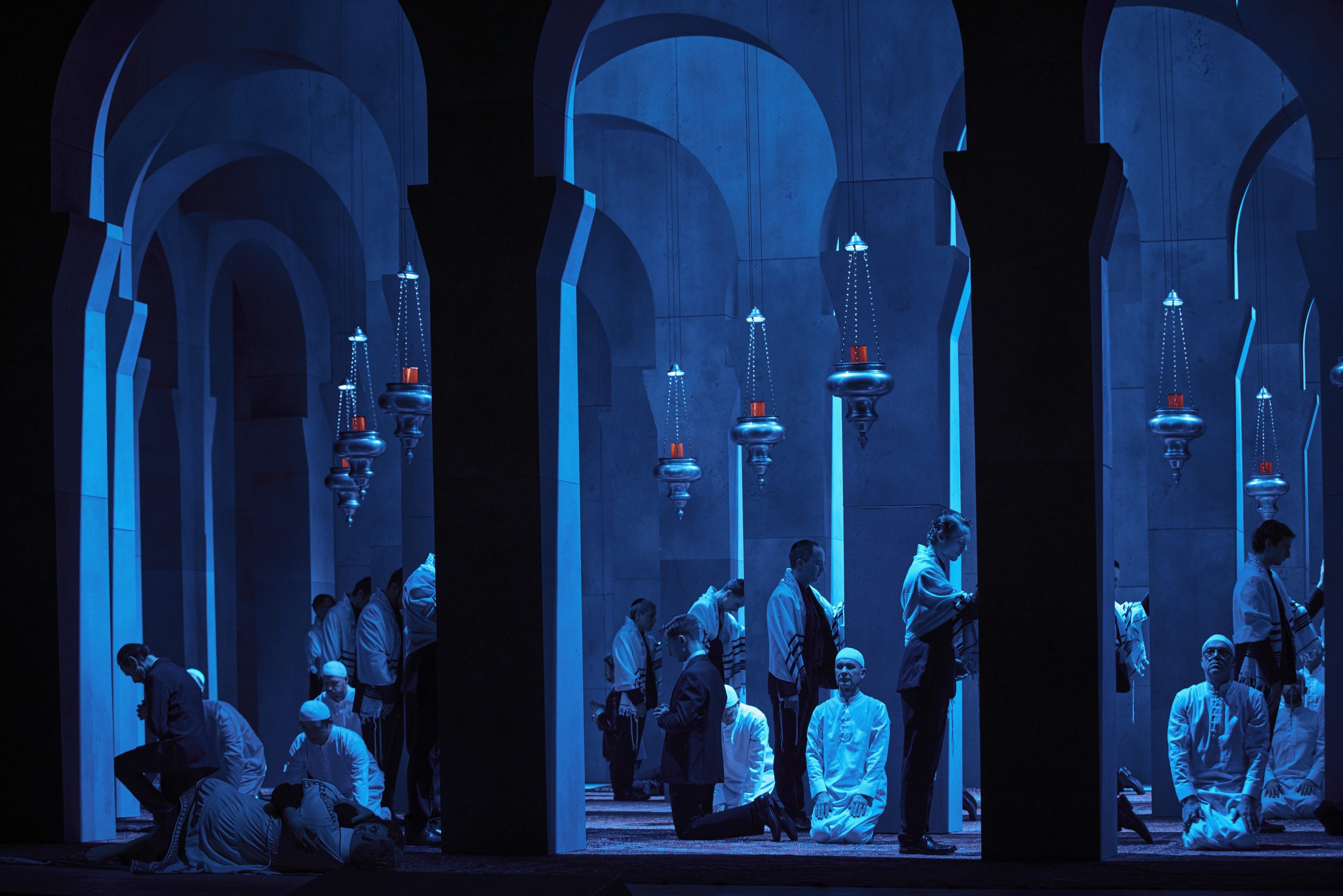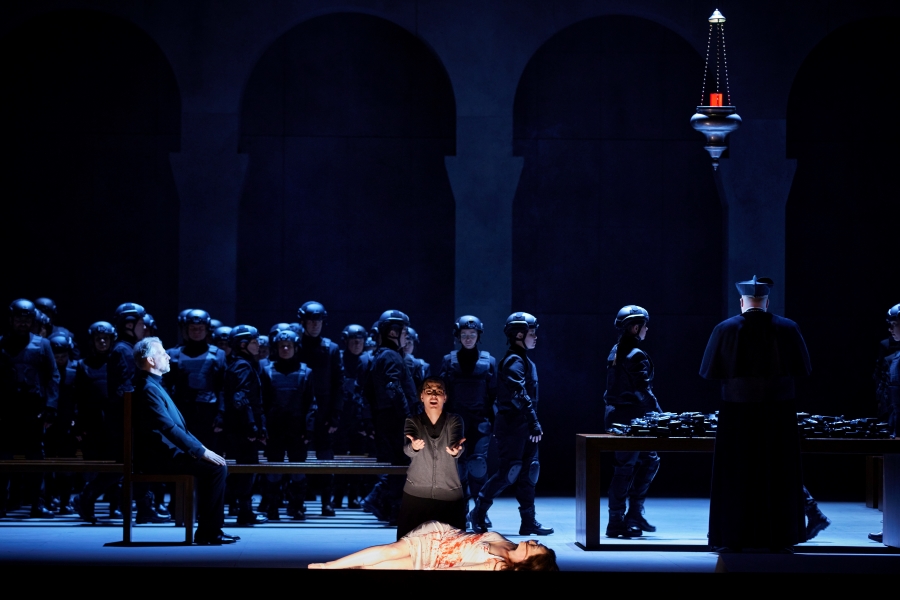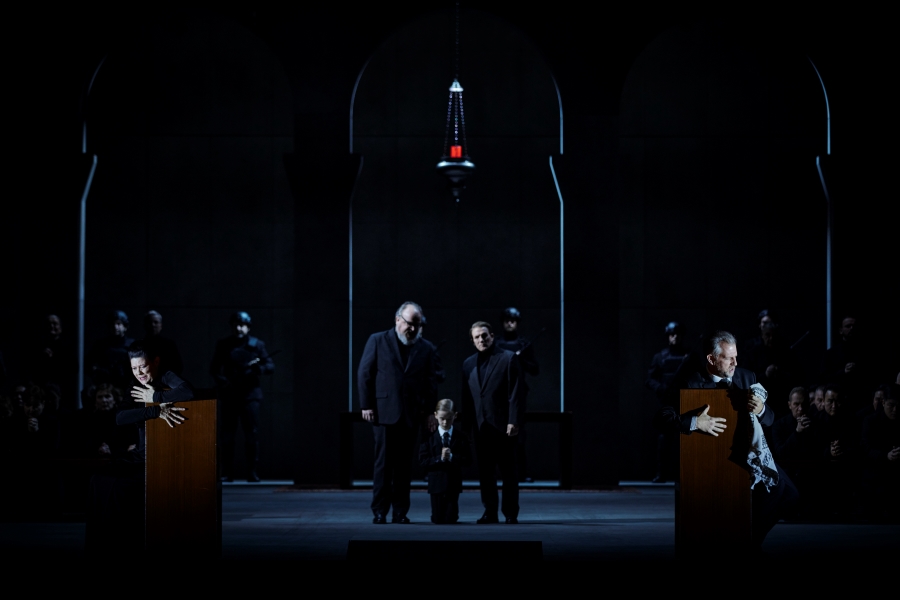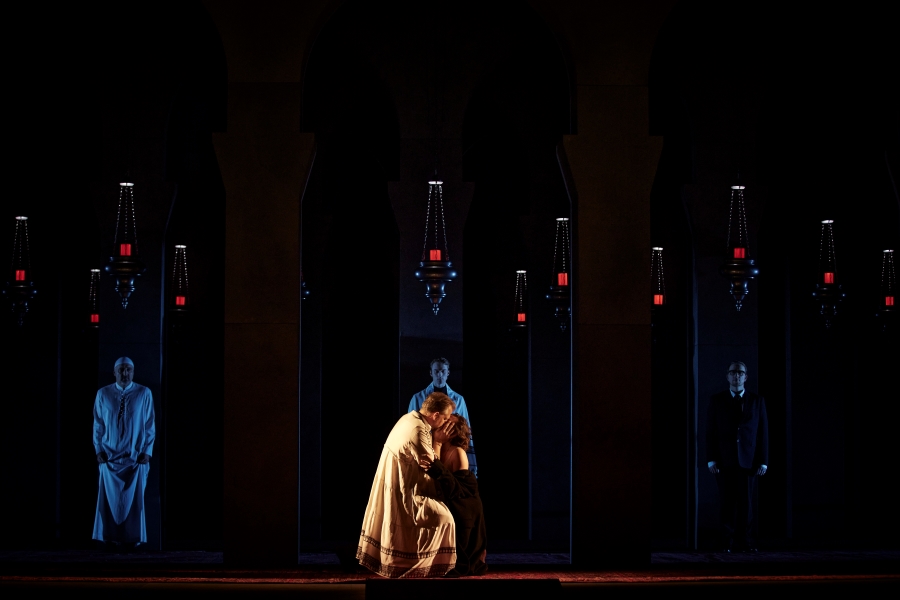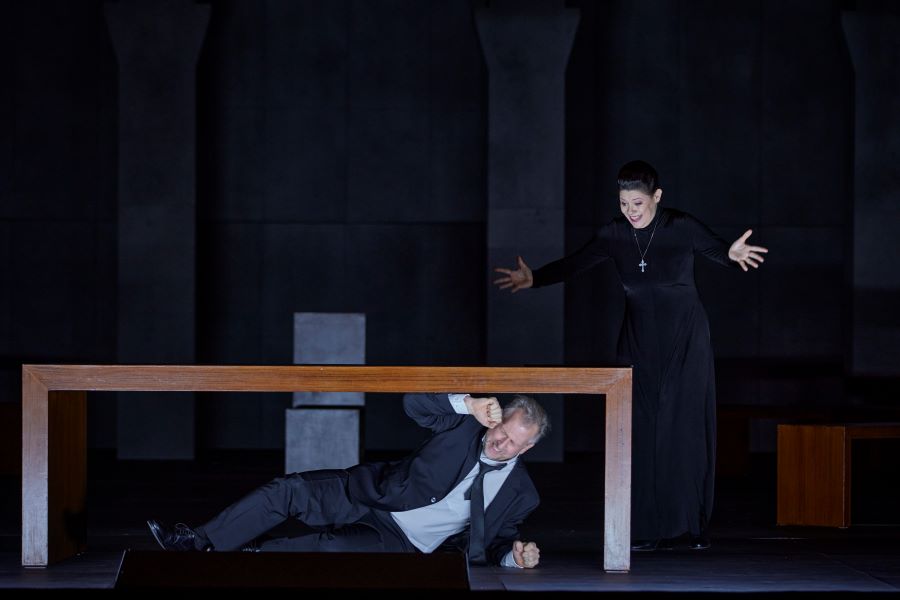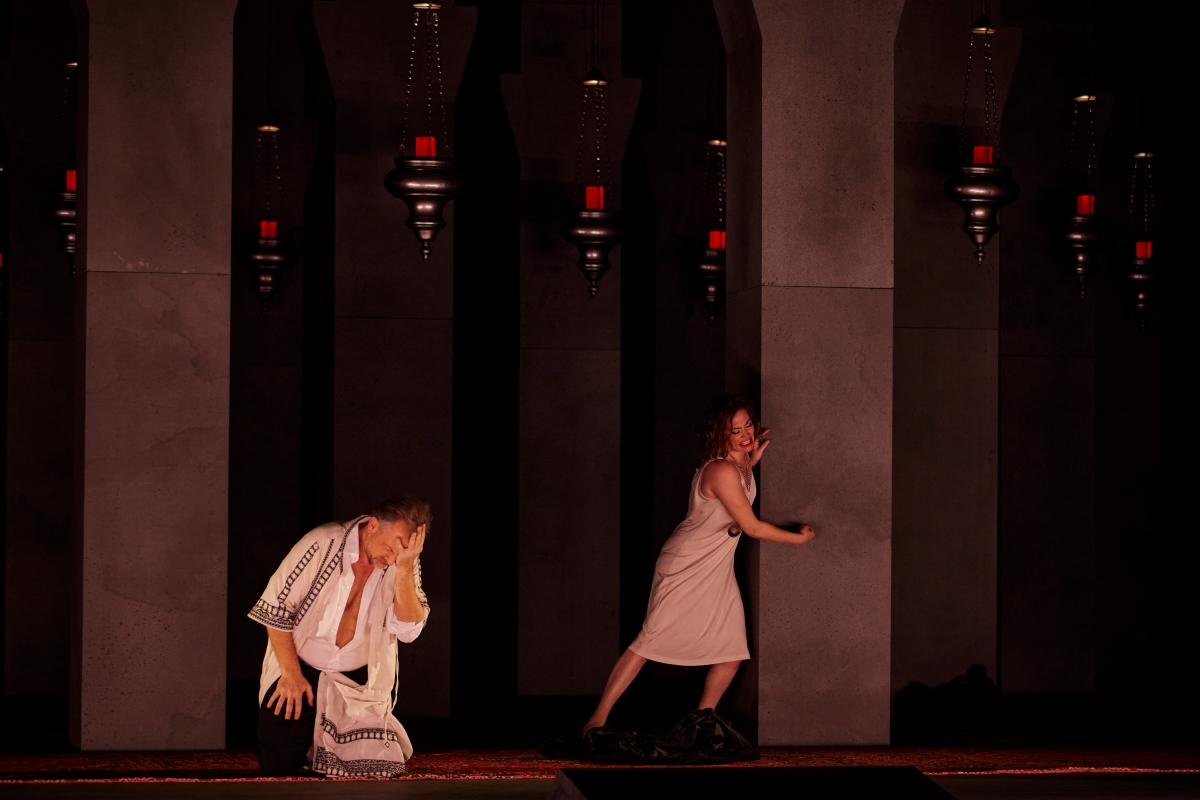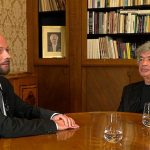review by Milan Valden
The German composer Detlev Glanert is one of the most successful contemporary opera composers and has already written fourteen operas and stage works. The most recent is Die Jüdin von Toledo, with a libretto by Hans-Ulrich Treichel, loosely based on the play of the same name by Franz Grillparzer. The world premiere, directed by Robert Carsen and scored by Jonathan Darlington, took place at the Semperoper Dresden on Saturday, February 10 2024.
Detlev Glanert was born in Hamburg in 1960 and spent four years studying under composer Hans Werner Henze in Cologne. He saw his first two operas in his hometown in 1972, when he was 12 years old. These were Mozart’s Die Zauberflöte and Zimmermann’s Die Soldaten – from the first moment he fell in love with opera and wanted to become an opera composer. But in addition to opera, he has also written works for chamber or large orchestras, including four symphonies, the last of which is entitled Prager Sinfonie. Lyrische Fragmente nach Franz Kafka. Its world premiere took place at Prague’s Rudolfinum on December 8, 2022. The Czech Philharmonic was conducted by Semyon Bychkov, a close friend of Glanert who frequently showcases his compositions. Other works include Mahler/Skizze (1989), Theatrum Bestiarum: Songs and Dances for Large Orchestra (2005), Fluß ohne Ufer (2008), and Requiem für Hieronymus Bosch (2016). In 2020, Glanert was named “Composer of the Year” in the OPUS Klassik Awards, and in the 2020/2021 season he won the International Opera Award.
The composer emphasizes the significance of connecting with the audience in his work, aiming for listeners to discover elements of themselves within the music: “It has to tell you something about your life and who you are. Opera must have this principle, just like orchestral music. If it doesn’t, it will cease to exist…” In addition to the influence of the Second Viennese School and his teacher Henze, Glanert admits that he found his own style somewhere between the opposing poles of Gustav Mahler and Maurice Ravel – Mahler with his structural perspective and “simple, dramatic sense of music” and Ravel with his surface textures and “artificial masquerade of sounds,” as the composer himself puts it.
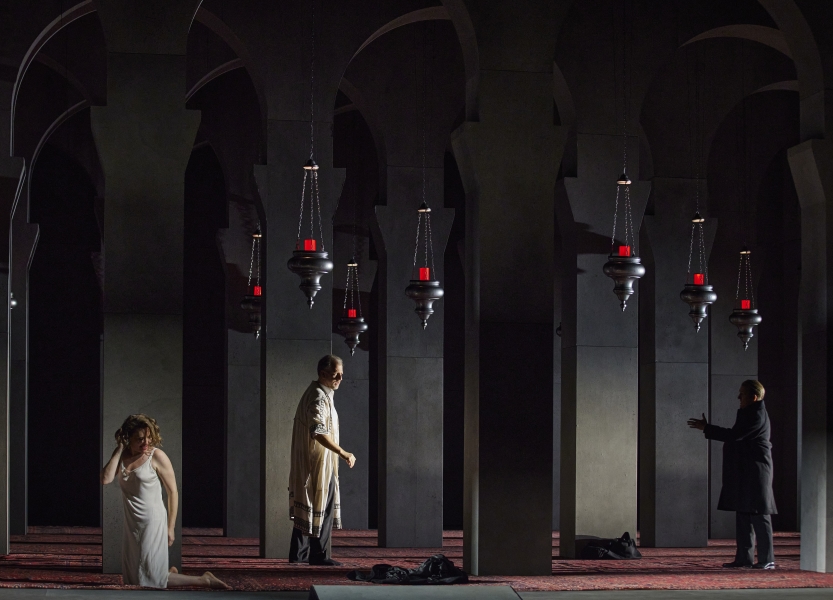
Detlev Glanert selects compelling literary subjects and themes for his operas.
In 1986, the initial segment of his Drei Wasserspiele trilogy, the short chamber opera Leviathan, inspired by Thornton Wilder, received its concert debut in Evian, France, and was later staged in Hamburg in 1991. The remaining components of the trilogy, Der Engel, der das Wasser bewegte and Der Engel auf dem Schiff, also based on Wilder’s works, premiered in Bremen in 1995. Glanert’s inaugural full-length opera was the musical fairy tale Leyla und Medjnun, adapted from Nizami’s epic poem (Munich, 1988). This was followed by the operas Der Spiegel des großen Kaisers based on a novel by Arnold Zweig (Mannheim, 1995), Joseph Süß (Bremen, 1999), Scherz, Satire, Ironie und tiefere Bedeutung based on a play by Christian Dietrich Grabbe (Halle, 2001), Die drei Rätsel (The Three Riddles, Halle, 2003), Caligula based on a play by Albert Camus (Frankfurt, 2006), Nijinskys Tagebuch about the life of the famous Russian dancer and choreographer V. Nijinsky (Aachen, 2008), Das Holzschiff based on the novel by Hans Henny Jahnn (Nuremberg, 2010), Solaris based on the famous science fiction novel by Stanislaw Lem (Bregenzer Festspiele, 2012) and Oceane based on the unfinished novel Oceane von Parceval by Theodor Fontane (Deutsche Oper Berlin, 2019).
The new opera The Jewess of Toledo was commissioned by the Saxon State Opera in Dresden, renowned Semperoper. While our primary knowledge of this historical story stems mainly from the novel of the same name by Lion Feuchtwanger, librettist Hans-Ulrich Treichel, with whom Glanert has collaborated on multiple occasions, drew loose inspiration from a lesser-known play by Austrian playwright and novelist Franz Grillparzer, who worked on the subject between 1848 and 1855. The premiere of the drama took place after the author’s death at the Estates Theatre in Prague on November 21 1872. It was performed at the Burgtheater in Vienna shortly afterwards, on 21 January 1873. The story is set in 1195 in Spanish Toledo, threatened by the Moors, and follows the love affair of King Alfonso VIII of Castile and his Jewish mistress, Rachel. From this historical tragedy emerges a successful opera in five acts, in which Detlev Glanert has combined a late romantic sound with 20th-century traditions to create a distinctive and highly nuanced tonal language.
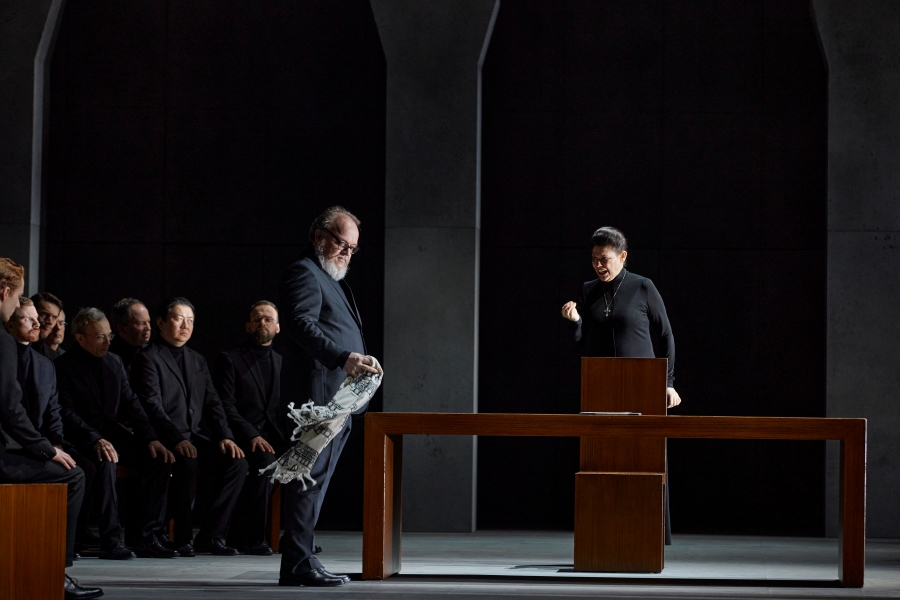
The straightforward story focuses on basic situations and just six characters, complemented by a large mixed chorus. The libretto goes to the core; there are no subplots or motifs, nor are there any extra characters. The audience simply has to accept that the libretto puts the characters where they need to be. King Alfonso of Castile, tired of his marriage to the cold and ambitious queen and the threat from the Moors, falls in love with a Jewish girl, Rachel, who impresses him at first sight with her immediacy, youth, animality, and courage when, despite the ban, she enters the gardens of the royal palace at Toledo with her older and more sensible sister Esther to meet the King. The love affair is discovered by the King’s mentor, the Count de Lara and his son – and the queen learns all about it too. War with the Moors is imminent, and orders must be given, but the King is interested in nothing but Rachel and does not want war. The Queen wants to overthrow him and try him for treason; she is about to remove an inconvenient mistress. Esther warns her sister in vain, but the girl desires only Alfonso. Under pressure from his wife and fearing that he will lose power, the king finally signs the death warrant, and Rachel is murdered. The king distances himself from everything. At the ceremony, the Cardinal blesses the arms and soldiers; they go to war, while Esther laments Rachel’s death…
Being eight hundred years old, the material presents a number of timeless themes: the contrast between marital and lover’s love; the forbidden love of the noble for the ignorant and the Christian for the Jewess; the succumbing to passion regardless of the consequences; the constant threat of war; the desire for power and control; betrayal; the clash of different religious faiths; the tug-of-war between reason and emotion. The two-hour opera is riveting and leaves the audience breathless; there is no room for boredom (after all, Glanert’s operas rarely exceed two hours in length) – the composer knows how to hold the attention. Musically, The Jewess of Toledo is not strikingly revolutionary; however the music is complicated and far from being in any way pandering or cloying – Glanert does not make things easy for the listener. In many passages, the composer makes opulent use of numerous percussion and other instruments (free and suspended cymbals, chained sizzle cymbals, metal kit, temple blocks, tam-tams, metal plates, whip, tambourine, drums, chimes, tubular bells, six gongs, etc.). But the softer lyrical passages were beautifully coloured, and the use of the Arabic stringed instrument al-oud was interesting.
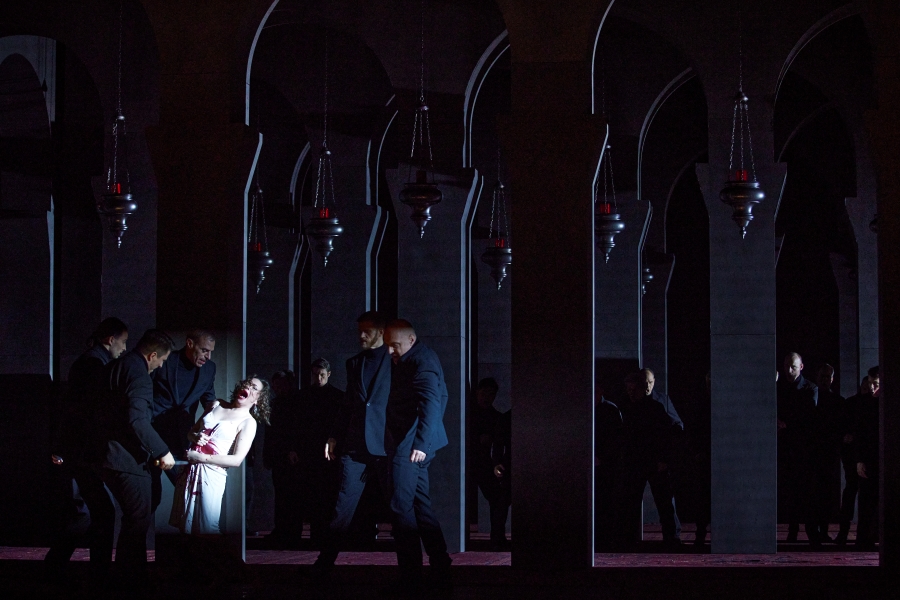
The world premiere of The Jewess of Toledo was directed by the renowned Canadian director Robert Carsen, making his debut in Dresden, who also designed the set and lighting. Carsen had already directed the premiere of Glanert’s previous opera Oceane in Berlin. We saw a typical Carsen, which is not meant negatively, on the contrary – great work with simple sets allowing for quick changes with space and lights, everything was set in dark colours and shadows – after all, the story doesn’t offer much light, even the love between the king and the Jewess couldn’t have ended in anything but a tragic way. A nice moment is when the king and Rachel exchange clothes to prove their love. Or when representatives of Christians, Jews and Muslims meet on stage, or the Queen’s insistence that the King do his duty and get rid of his mistress. And above all, a powerful ending: soldiers with weapons blessed by the Cardinal, the dead body of the slain Rachel lying in the foreground, and shots of tanks, warships or planes begin to project in the background, and then, as the soldiers fall to their deaths, we see the war-ravaged landscape and bombed-out cities. Among the dead bodies of the soldiers, only the king’s little son is left standing, staring into the audience in horror, but perhaps also a promise of hope. The contemporary, simple costumes did not distract in any way, on the contrary, they underlined the timelessness of the fabric.
The music staging was supervised by the British conductor Jonathan Darlington, who has been the chief conductor of the Nuremberg Symphony since 2022 and who has already been at the podium of the Vienna Philharmonic, the Orchestre National de France, the Royal Philharmonic Orchestra, and the Orchestre de la Suisse Romande. He has conducted Don Giovanni, Die Zauberflöte, Fidelio, Die Fledermaus, and Il Barbiere di Siviglia at the Semperoper. Darlington has handled the complicated score well, and the credit for this goes as always to the wonderful playing of the Staatskapelle Dresden – it is a real pleasure to listen to one of the best (not only) operatic orchestras in the world. The massive chorus, which has a large space in Glanert’s opera, did a big task.
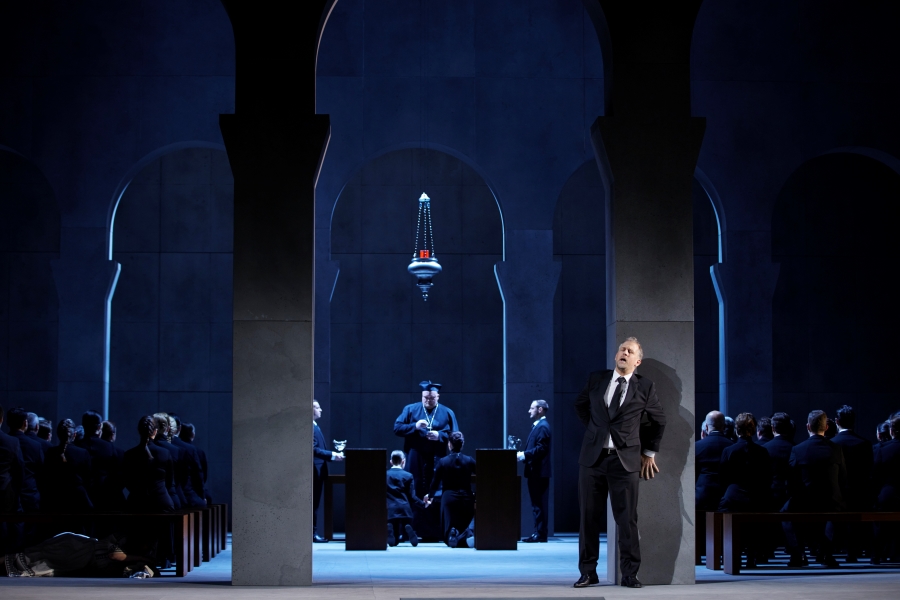
The soloists also deserve great praise. Baritone Christoph Pohl (who also sang in the premiere of Glanert’s Oceane in Berlin), with his beautifully coloured and sonorous voice, accurately captured the complexity of his character’s dilemmas, perhaps the most elaborate of the whole work: his king has passion, fear of war and weakness when he finally gives up his love, though he is perhaps more of a realist – he knows he has no other way out. The mezzo-soprano Tanja Ariane Baumgartner, with her rich, powerful voice, was quite accurate as the cold, dignified, jealous, and power- and war-hungry Queen Eleanor, who is not afraid to confront the King and possibly overthrow him – when she urged him to sign the sentence on Rachel, the audience was almost breathless (and under her pressure, anyone would probably sign). Soprano Heidi Stober was a superb young Rachel with her immediacy, naivety, and infatuation that completely blinded her. Mezzo-soprano Lilly Jørstad has a solid metallic voice, so we believed her to be quite different from her sister: more sensible, worried about Rachel, faithfully accompanying her, and under no illusions that the King would sacrifice everything for his love. A long-time mainstay of Semper’s opera, bass Markus Marquardt (who sang Wotan and the painter Mathis in Dresden) was precisely cast as Count de Lara, the king’s friend and mentor, who is torn between loyalty to the king and service to the queen and cannot tolerate the king’s relationship with a Jewish girl, which threatens the entire kingdom. In this, he is helped by his son, in whose smaller role tenor Aaron Pegram is not lost.
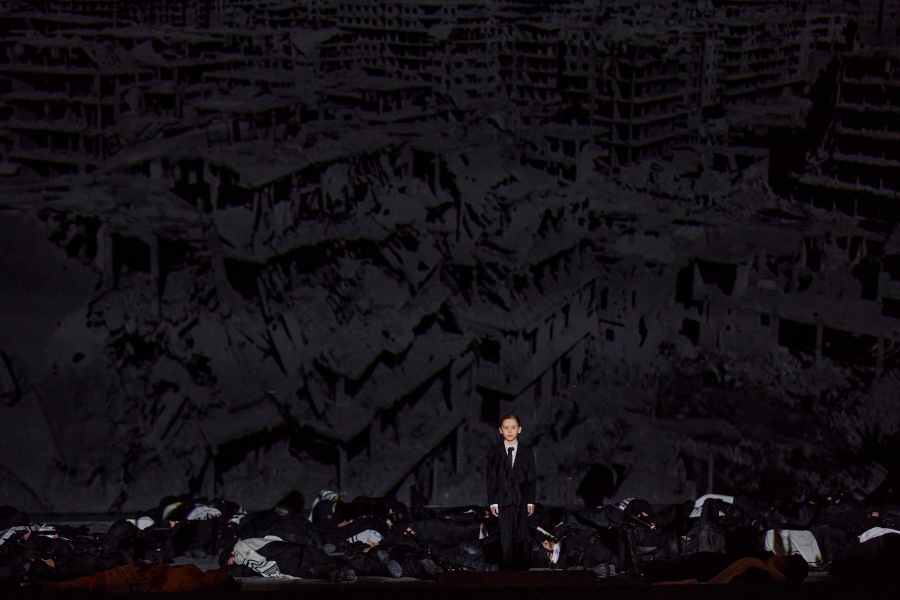
All in all, the premiere was a tremendous success, which the audience acknowledged with a thunderous ovation for the orchestra, conductor, performers, and the entire production team, as well as the composer and librettist.
Die Jüdin von Toledo
World Premiere 10 February 2024, 6:00 pm
Semperoper, Dresden
Music: Detlev Glanert
Libretto: Hans-Ulrich Treichel
Production team:
Conductor: Jonathan Darlington
Director: Robert Carsen
Set: Robert Carsen, Luis F. Carvalho
Assistant Director: Gilles Rico
Costumes: Luis F. Carvalho
Lights: Robert Carsen, Peter Van Praet
Videodesign: Martin Eidenberger
Choreography: Marco Berriel
Choirmaster: Jonathan Becker
Dramaturgy: Martin Lühr, Benedikt Stampfli
Cast:
Heidi Stober – Rahel
Lilly Jørstad – Esther, her sister
Christoph Pohl – Alfonso VIII, King of Castile
Tanja Ariane Baumgartner – Eleonora of England, his wife
Markus Marquardt – Count Manrique de Lara
Aaron Pegram – Don Garceran, his son
Sächsischer Staatsopernchor Dresden
Sächsische Staatskapelle Dresden
